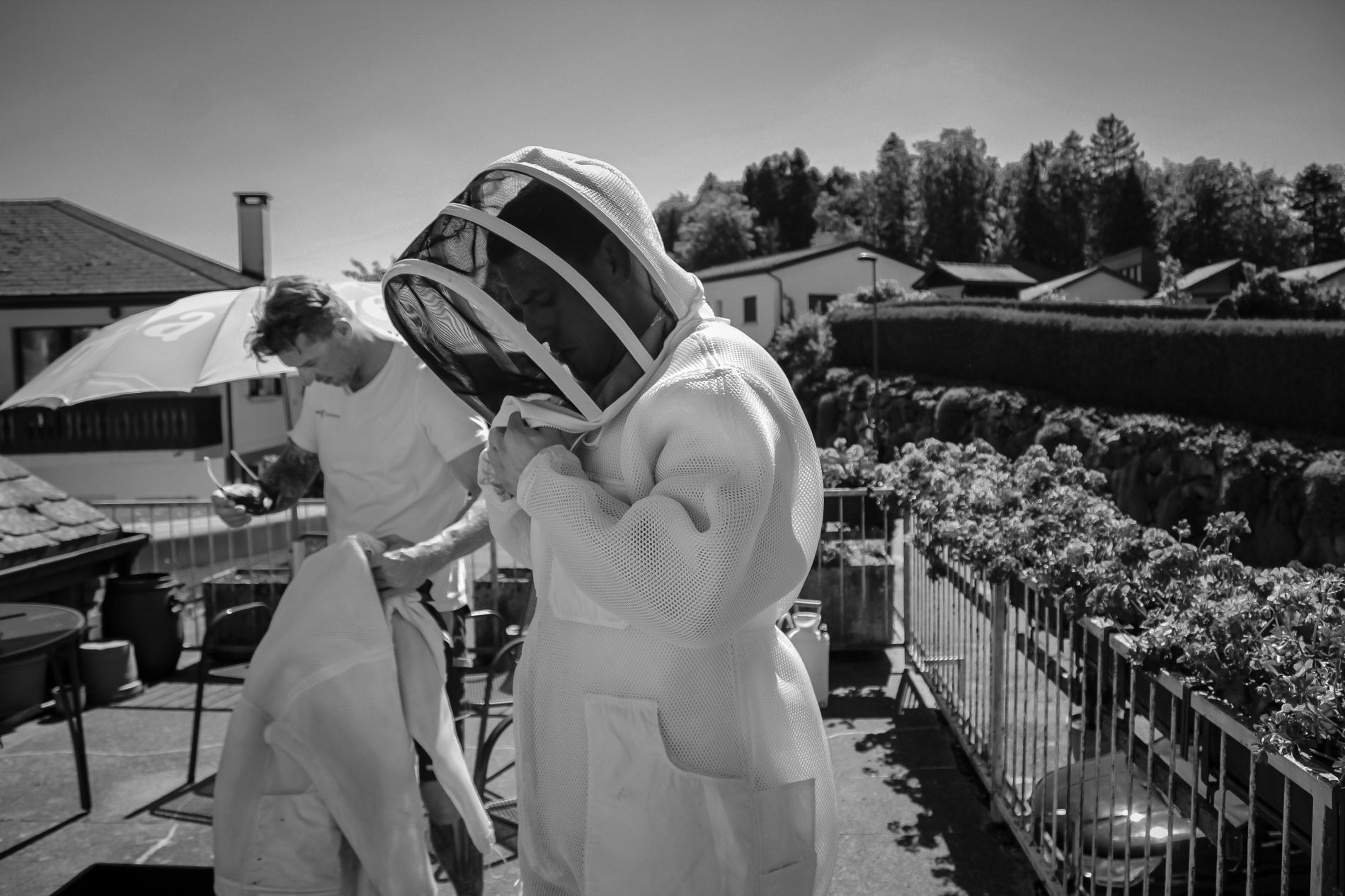
Fighting Asian hornets in Davos
Have you discovered an Asian hornet's nest? We'll be on site quickly! Call now - Daily Mon-Sun 07:00-21:30. Contact us now: 058 510 22 54
Having the Asian hornet's nest removed
Vespa velutina, a hornet species from South-East Asia, has expanded invasively to Switzerland and throughout the subcontinent. Although not posing a threat to humans, its reputation as a honey bee hunter has significantly alarmed beekeepers. Within a few hours, a few of these hornets can launch an attack that obliterates an entire colony of bees. If you have discovered a hornet's nest on your house, patio, shed, or in your blind box, contact our experts for hornet nest removal in Davos!
Use the uncomplicated telephone service of the Hornet experts in Davos and simply inform us at 058 510 22 54, we will be on site quickly so that you and everyone in your area feel completely safe again.
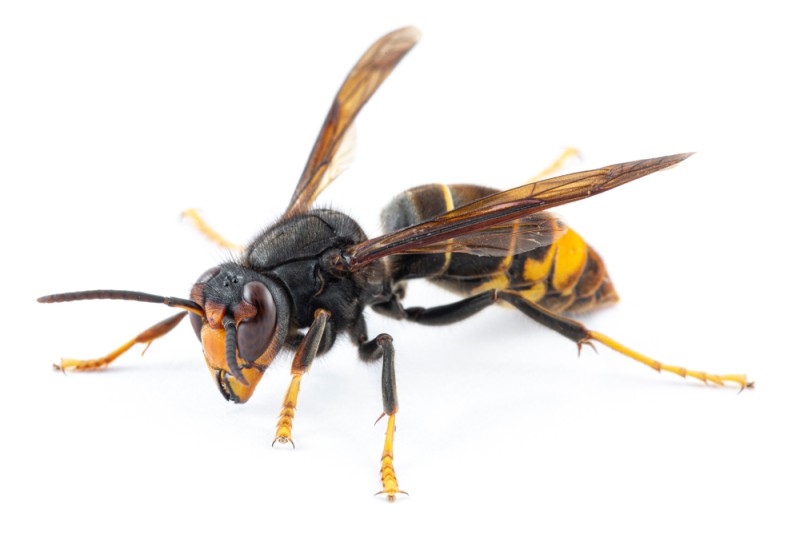

Appearance of the Asian hornet
Here are some characteristics that distinguish the Asian hornet:
1. Size: The queen can reach a length of about 3 cm, while the workers are slightly smaller and measure about 2.5 cm.
2. Color: The Asian hornet has a dark body that is almost black, with a yellow stripe at the back of the abdomen. Its face is orange-yellow.
3. Wings: The wings are dark and almost smoky gray.
4. Legs: The hornet has yellow tips on its legs, which is a striking distinguishing feature when it flies.
5. Nest: The Asian hornet's nest is often high in the trees, but it can also be found underground or in tall structures such as chimneys. It has an oval shape and is made of chewed wood, which gives the hornet a papery texture.
It is important to distinguish the Asian hornet from the European hornet (Vespa crabro), which is more harmless and a natural part of the European fauna. If you suspect you have found an Asian hornet nest near you in Davos, you should report this to the local authorities, or using our reporting form, as they can spread quickly and be harmful to bees and other insects. To avoid being attacked by the flying inhabitants, you should hire a professional pest controller such as the Hornet Experts Davos. We can identify the nest beyond doubt and take further steps to remove the Asian hornets professionally.
News about the Asian hornet in Davos
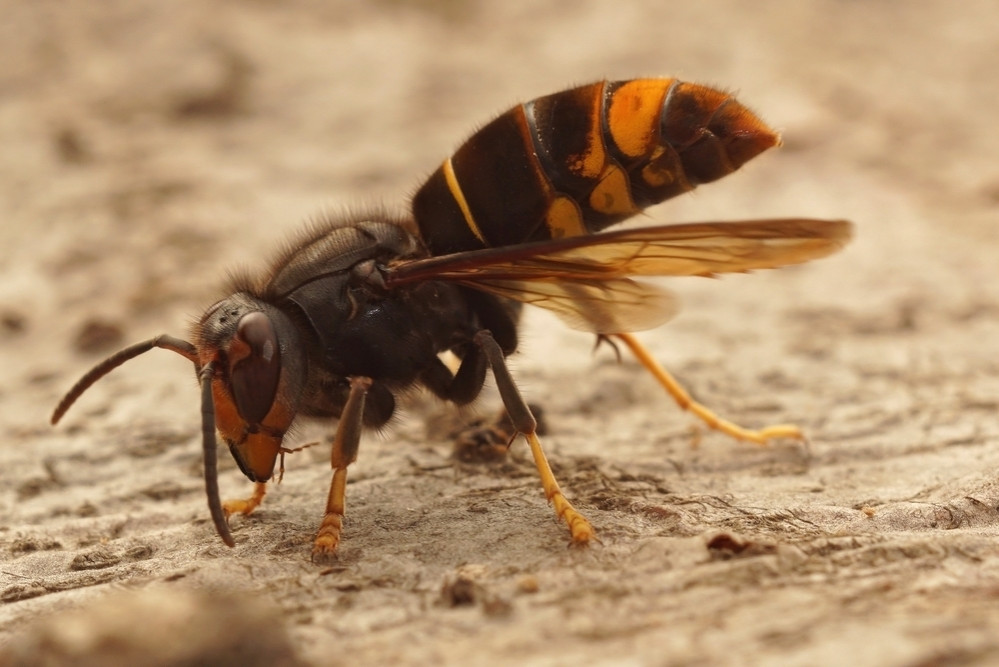
02.12.2025 Western Switzerland: Killer hornet eats bees
The territory of the Asian killer hornet has expanded considerably this year, with a notable increase reported in western Switzerland. This invasive species poses a significant threat to native bee populations, as bees make up the majority of its diet. The potential consequences are serious. Moreover, the hornet represents a danger to individuals with allergies to its venom.
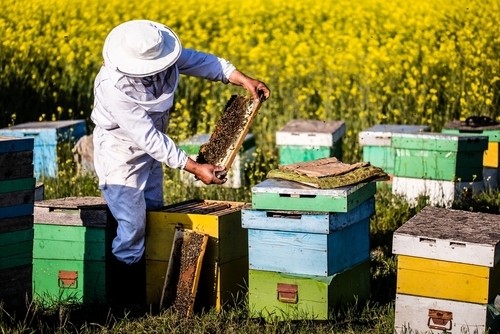
25.11.2025 Serious concerns about the bee population!
Asian hornets are inflicting significant harm on beehives across multiple parts of Europe, as reported by local beekeepers. Even a small number of hornets can destroy an entire bee colony within hours. This sharp decline in pollinators could have serious consequences for pollination, local ecosystems, and agricultural productivity.
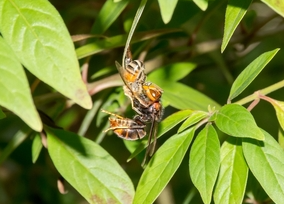
18.11.2025 Asian hornet doesn't just eat bees!
The danger it presents to insects is substantial!
The Asian hornet feeds largely on honeybees—up to 85 percent of its diet—alongside beetles and flies. This high level of predation not only poses difficulties for fruit growers but also further threatens already vulnerable bee populations.
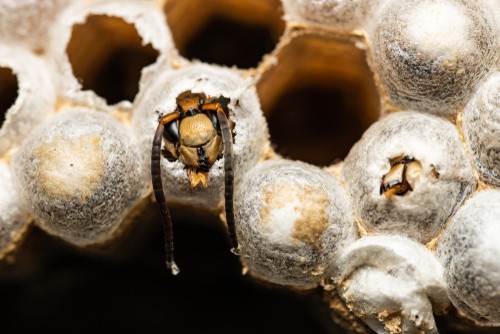
11.11.2025 How did the Asian hornet get to Europe?
The Asian hornet likely arrived in Europe unintentionally and has quickly expanded throughout France and nearby countries. Its adaptability to different environments and the absence of natural predators have contributed to its rapid spread. A single nest can generate several hundred new queens in one breeding season.
Asian Hornet Reporting Form
Please fill out all required fields and submit the form.
Help us!
If you discover an Asian hornet or a nest of this invasive species in Davos, it is of the utmost importance that you report it immediately. The Asian hornet is not only dangerous to humans, but also poses a serious threat to native bee populations and the ecological balance in Switzerland.
Why is it important to report the find?
The Asian hornet, upon establishing its presence in particular regions, poses a significant threat to native insects, most notably honey bees. As they feed on bees, it triggers a decline in pollinator populations, which reverberates throughout the ecosystem, ultimately impacting local flora and agricultural yield. By reporting sightings, experts can react quickly, remove the hornets or their nests and thus prevent the spread of this invasive species.
Notification form for sightings
We depend on your assistance to regulate the overpopulation of the Asian hornet in Switzerland and protect our native insects. Please report any suspicions or sightings by utilizing our special reporting form. Your contributions enable us to intervene at an early stage, curbing the spread of this perilous species and preserving the ecological harmony of our precious habitats.
Your contribution is crucial in the fight against the Asian hornet in Davos. Together we can protect nature and maintain the balance of our ecosystems;
Thank you for your vigilant attention and your commitment to protecting our environment.
How dangerous is the Asian hornet?
The Asian hornet (Vespa velutina) is a predatory insect that originated in Asia and has spread in recent years to various parts of Europe, including France and now also Switzerland and in Davos. Although it poses a threat to honey bees and native biodiversity, it is generally no more dangerous to humans than other wasp species. Nevertheless, there are some aspects to be aware of:
1. Threat to honey bees: The Asian hornet preys on honey bees, threatening native bee populations. A decline in bees can have a negative impact on pollination and thus on local flora and agricultural production.
2. Stings: As with other wasp and hornet species, the stings of the Asian hornet can also be painful. For most people, the stings are unpleasant but not dangerous. However, people who are allergic to wasp or hornet stings can suffer a severe allergic reaction, which in the worst case can lead to anaphylactic shock.
3. Aggressiveness: Although the Asian hornet is not necessarily more aggressive towards humans than other wasp species, it can become aggressive if it feels threatened, especially near its nest.
4. Ecological effects: Apart from the direct effects on honey bees, the spread of the Asian hornet can also disturb the ecological balance by affecting the populations of other insects.
It should be noted that the Asian hornet and the Asian giant hornet (*Vespa mandarinia*) are distinct species. The giant hornet, nicknamed the "killer hornet," is larger and potentially more dangerous to humans because of its more potent venom and the size of its sting.
If you have discovered a nest, call us immediately: 058 510 22 54
Our hornet professionals in Davos are certified by the VSS.
Frequently Asked Questions About Asian Hornets in Davos
The Asian hornet surpasses most other hornet species in terms of danger, with its stings carrying the potential for severe or even fatal consequences.
Standing as a sizeable stinging insect, the Asian hornet measures up to 3 cm in length. Its narrow black body is adorned with a dense and captivating combination of orange, yellow, and black stripes.
Despite its usual shyness and passiveness, the Asian hornet becomes remarkably active and aggressive when threatened and cornered, demonstrating its fierce and effective defense strategy.
The Asian hornet's highly poisonous venom presents a significant danger to humans, as its bites are known to cause severe pain and can result in allergic responses.
Caution must be exercised around the Asian hornet as its sting is highly toxic, causing more pain than other wasps and potentially leading to allergic responses.
When it comes to reporting an Asian hornet, it is necessary to contact either a regional wild bee protection officer or the specific agency under the responsible Ministry of Agriculture.
Reporting Asian hornets is indispensable for preventing attacks and controlling their dissemination. This type of insect is highly territorial and exhibits aggression.
In Switzerland, addressing the presence of Asian hornets effectively necessitates professional hornet control measures. Contacting a reputable pest control service is advised for prompt assistance.
The Asian hornet is not included in protected species; however, strict monitoring is required to control their population and prevent their spread.
Asian hornets prepare for hibernation by occupying either a communal space or isolated positions, retreating to the corners of walls, structures, garden sheds, occasional houses, or tree hollows.
Would you like more information about Asian hornets? Then take a look at our FAQ's about Asian hornets.
Private inquiry form
For an uncomplicated request to remove an Asian hornet's nest, please use our contact form for private individuals.
Real estate inquiry form
Use our property management order form to request the removal of an Asian hornet's nest.




_24.jpeg)
_22.jpeg)
_19.jpeg)
_18.jpeg)